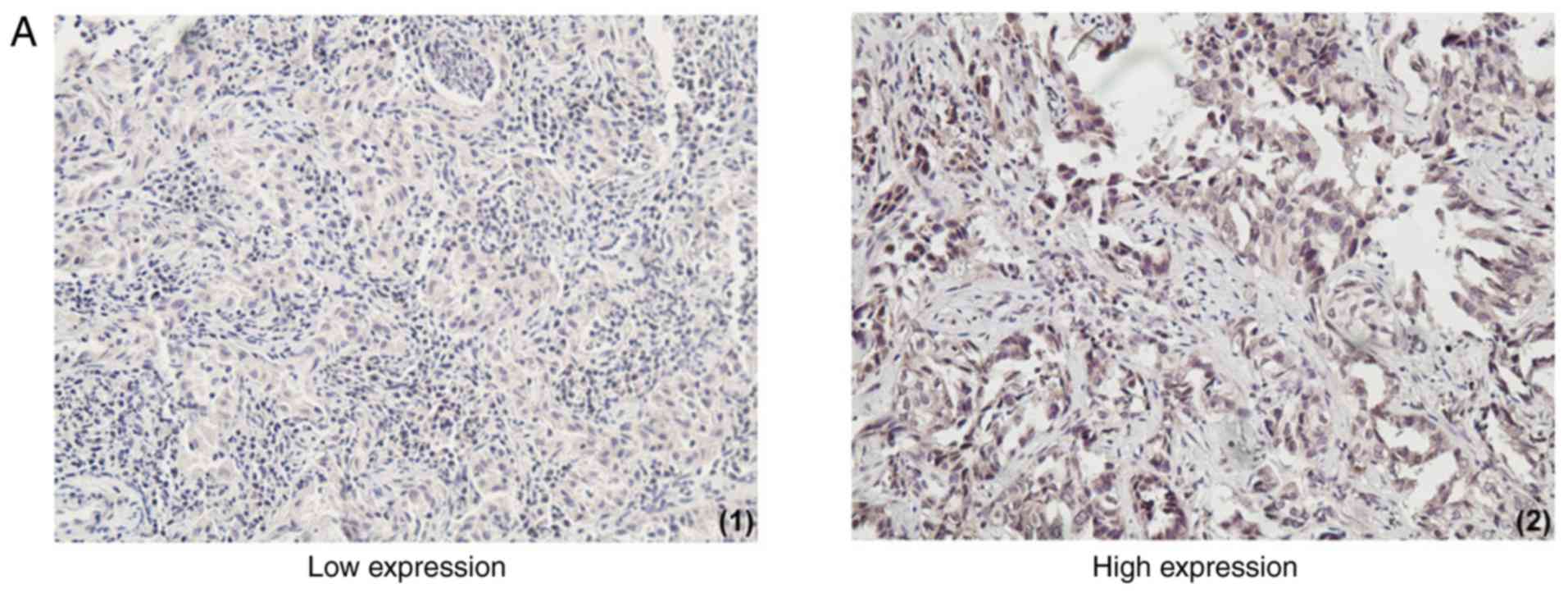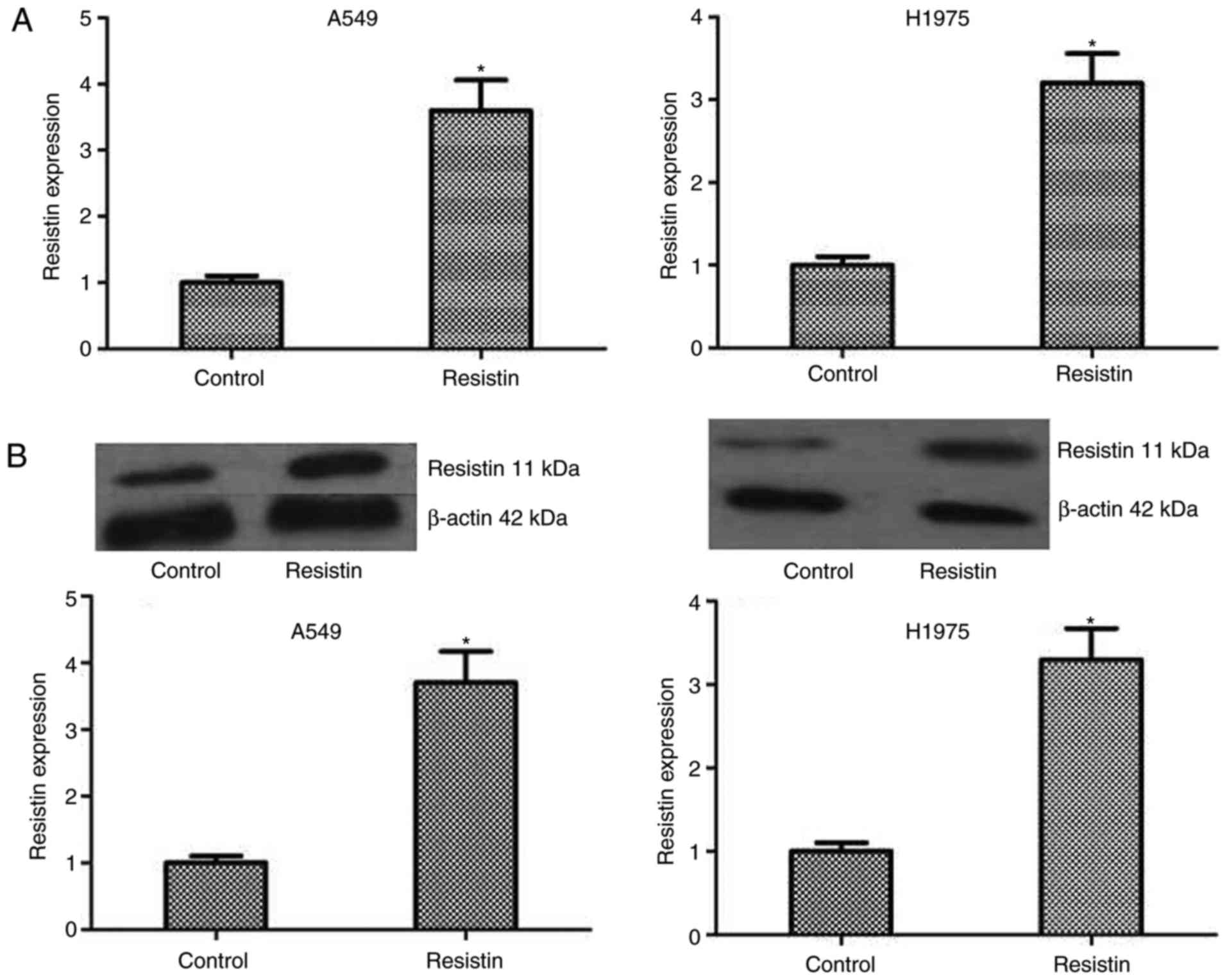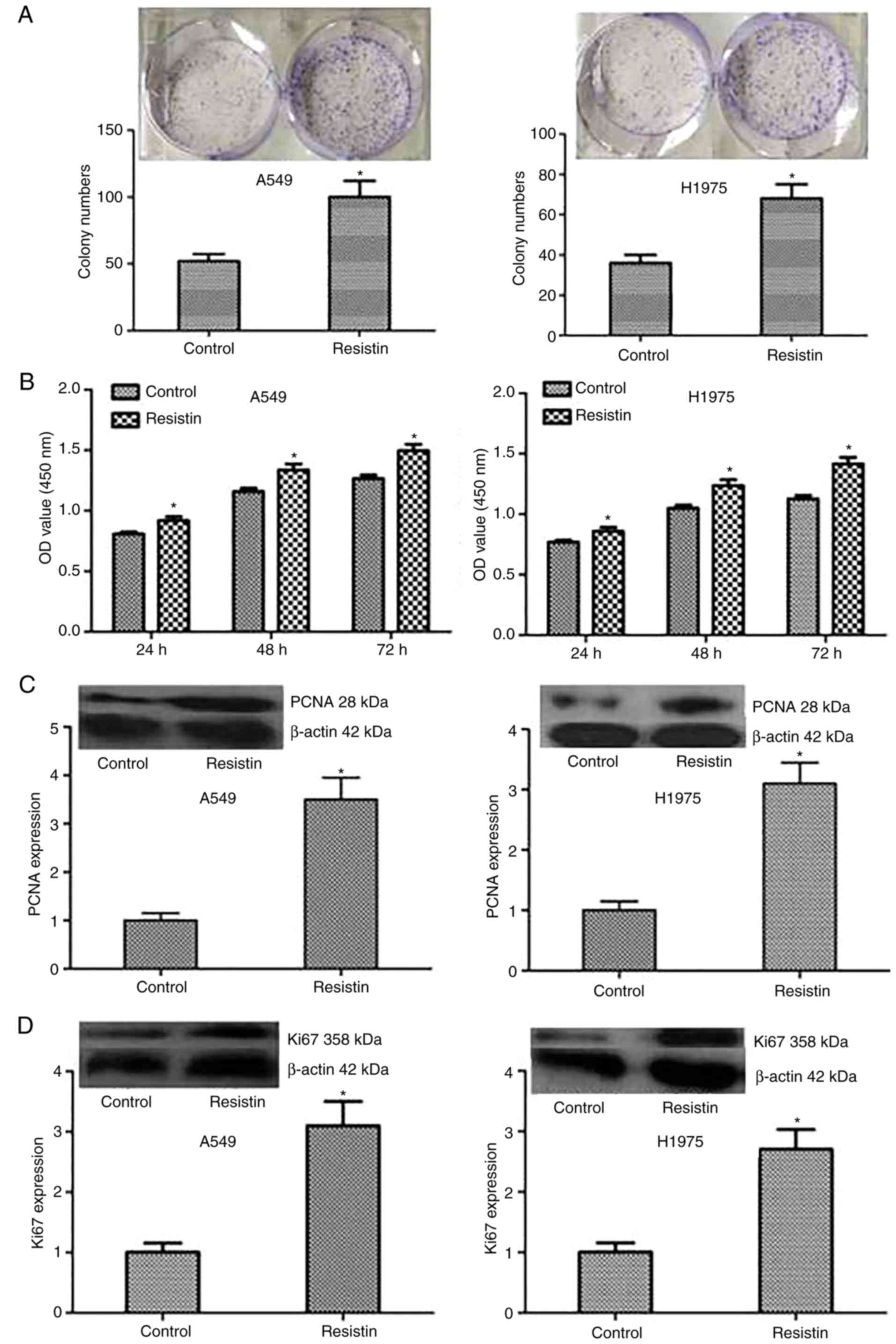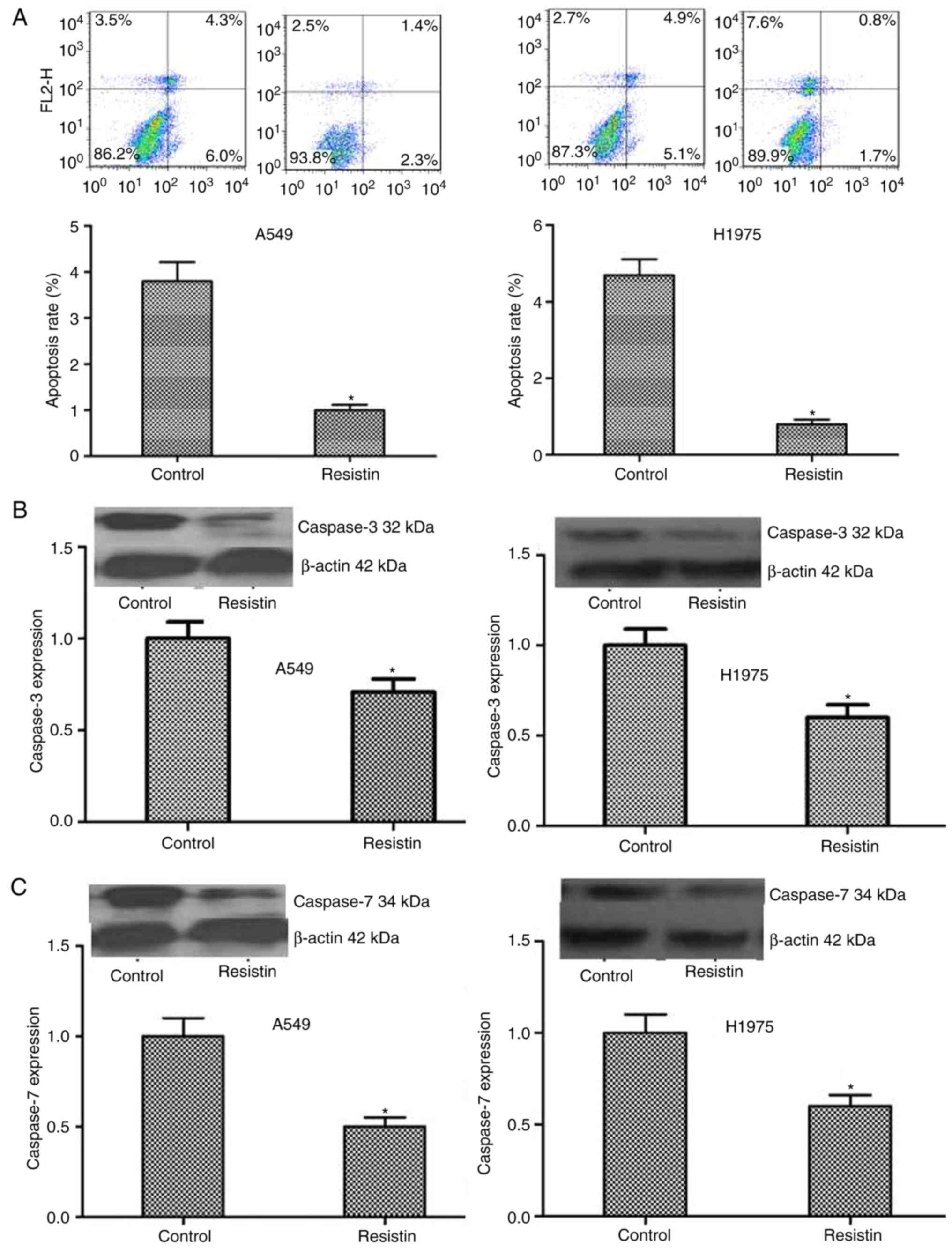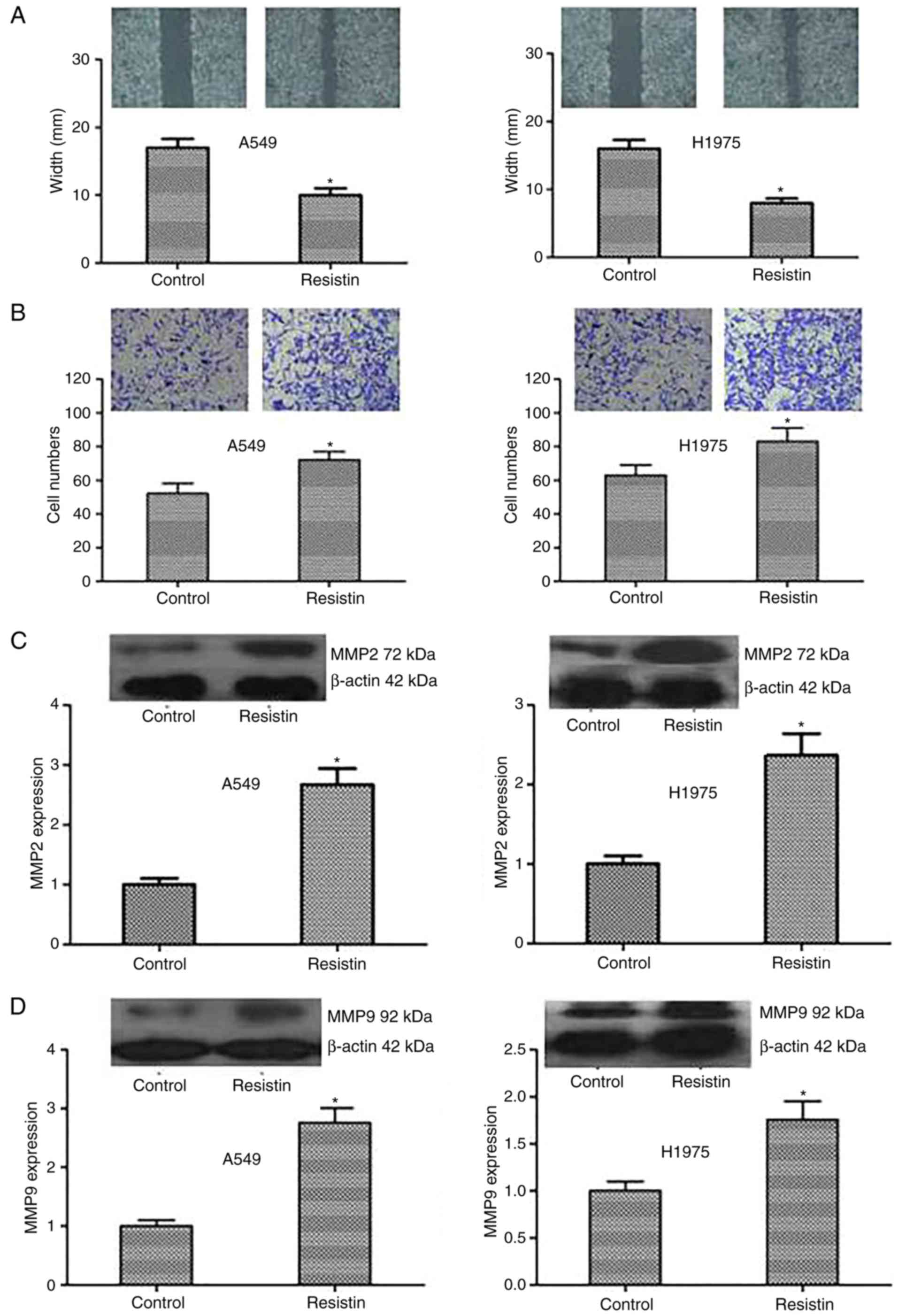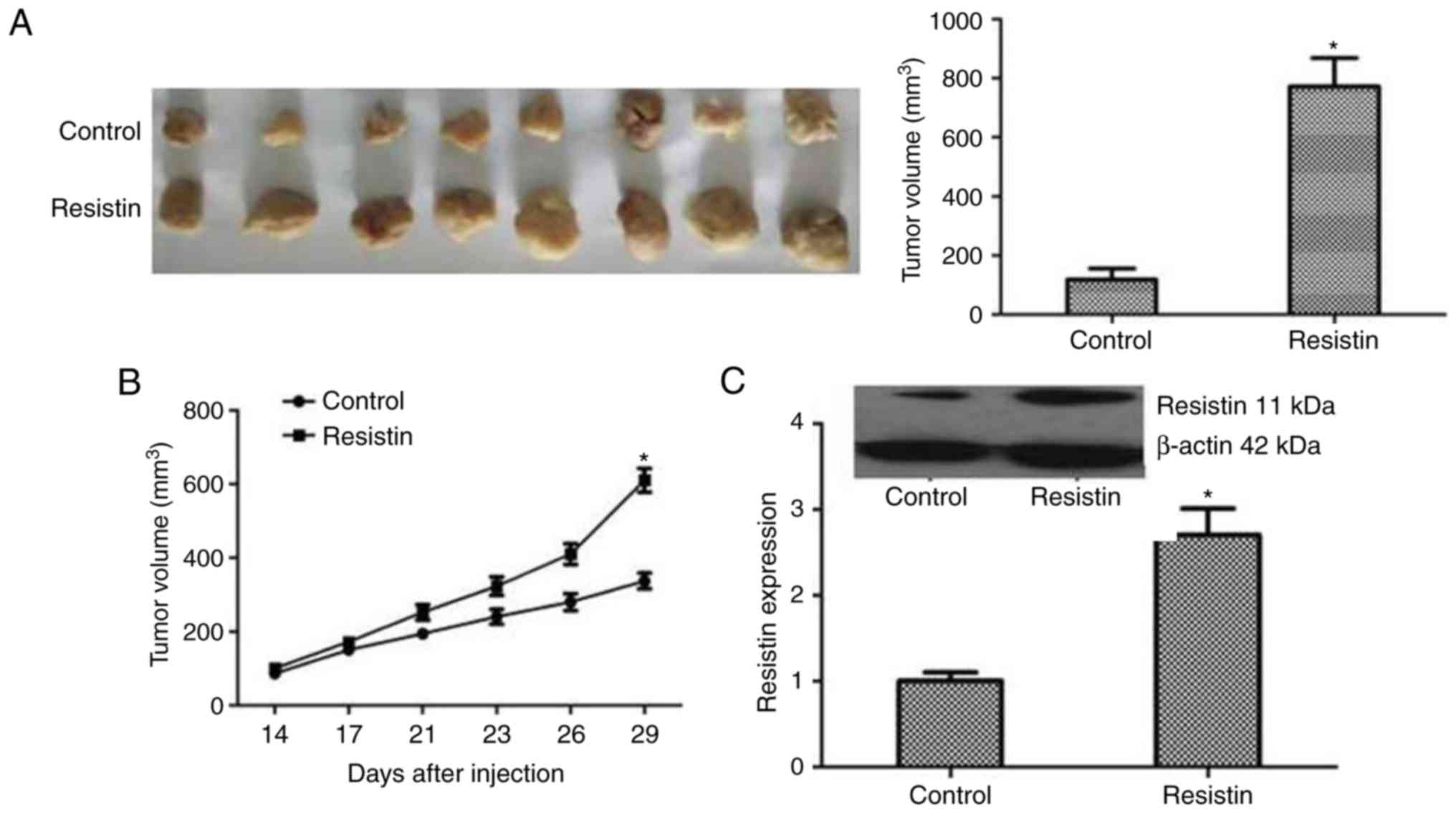|
1
|
Slomian G, Świętochowska E,
Malinowska-Borowska J, Kasperczyk S, Rogalska A and Nowak P:
Association between chemotherapy and plasma adipokines in patients
with colorectal cancer. Pharmacol Rep. 66:902–907. 2014. View Article : Google Scholar : PubMed/NCBI
|
|
2
|
Sălăgeanu A, Tucureanu C, Lerescu L, Caraş
I, Pitica R, Gangurà G, Costea R and Neagu S: Serum levels of
adipokines resistin and leptin in patients with colon cancer. J Med
Life. 3:416–420. 2010.PubMed/NCBI
|
|
3
|
Zemanová M, Staňková B, Ušiakova Z,
Tvrzická E, Pazdro A, Petruželka L and Zeman M: Serum adiponectin
relates to shortened overall survival in men with squamous cell
esophageal cancer treated with preoperative concurrent
chemoradiotherapy: A pilot study. Med Sci Monit. 20:2351–2357.
2014. View Article : Google Scholar : PubMed/NCBI
|
|
4
|
Dalamaga M: Resistin as a biomarker
linking obesity and inflammation to cancer: Potential clinical
perspectives. Biomark Med. 8:107–118. 2014. View Article : Google Scholar : PubMed/NCBI
|
|
5
|
Jiang CY, Wang W, Yin YL, Yuan ZR and Wang
LB: Expression of the adipocytokine resistin and its association
with the clinicopathological features and prognosis of pancreatic
ductal adenocarcinoma. Oncol Lett. 4:960–964. 2012. View Article : Google Scholar : PubMed/NCBI
|
|
6
|
Nakajima TE, Yamada Y, Hamano T, Furuta K,
Oda I, Kato H, Kato K, Hamaguchi T and Shimada Y: Adipocytokines
and squamous cell carcinoma of the esophagus. J Cancer Res Clin
Oncol. 136:261–266. 2010. View Article : Google Scholar : PubMed/NCBI
|
|
7
|
Nakajima TE, Yamada Y, Hamano T, Furuta K,
Gotoda T, Katai H, Kato K, Hamaguchi T and Shimada Y: Adipocytokine
levels in gastric cancer patients: Resistin and visfatin as
biomarkers of gastric cancer. J Gastroenterol. 44:685–690. 2009.
View Article : Google Scholar : PubMed/NCBI
|
|
8
|
Gonullu G, Kahraman H, Bedir A, Bektas A
and Yücel I: Association between adiponectin, resistin, insulin
resistance, and colorectal tumors. Int J Colorectal Dis.
25:205–212. 2010. View Article : Google Scholar : PubMed/NCBI
|
|
9
|
Sun CA, Wu MH, Chu CH, Chou YC, Hsu GC,
Yang T, Chou WY, Yu CP and Yu JC: Adipocytokine resistin and breast
cancer risk. Breast Cancer Res Treat. 123:869–876. 2010. View Article : Google Scholar : PubMed/NCBI
|
|
10
|
Kang JH, Yu BY and Youn DS: Relationship
of serum adiponectin and resistin levels with breast cancer risk. J
Korean Med Sci. 22:117–121. 2007. View Article : Google Scholar : PubMed/NCBI
|
|
11
|
Hlavna M, Kohut L, Lipkova J,
Bienertova-Vasku J, Dostalova Z, Chovanec J and Vasku A:
Relationship of resistin levels with endometrial cancer risk.
Neoplasma. 58:124–128. 2011. View Article : Google Scholar : PubMed/NCBI
|
|
12
|
Filková M, Haluzík M, Gay S and Senolt L:
The role of resistin as a regulator of inflammation: Implications
for various human pathologies. Clin Immunol. 133:157–170. 2009.
View Article : Google Scholar : PubMed/NCBI
|
|
13
|
Lee YC, Chen YJ, Wu CC, Lo S, Hou MF and
Yuan SS: Resistin expression in breast cancer tissue as a marker of
prognosis and hormone therapy stratification. Gynecol Oncol.
125:742–750. 2012. View Article : Google Scholar : PubMed/NCBI
|
|
14
|
Kim HJ, Lee YS, Won EH, Chang IH, Kim TH,
Park ES, Kim MK, Kim W and Myung SC: Expression of resistin in the
prostate and its stimulatory effect on prostate cancer cell
proliferation. BJU Int. 108:E77–E83. 2011. View Article : Google Scholar : PubMed/NCBI
|
|
15
|
Ntikoudi E, Kiagia M, Boura P and Syrigos
KN: Hormones of adipose tissue and their biologic role in lung
cancer. Cancer Treat Rev. 40:22–30. 2014. View Article : Google Scholar : PubMed/NCBI
|
|
16
|
Karapanagiotou EM, Tsochatzis EA, Dilana
KD, Tourkantonis I, Gratsias I and Syrigos KN: The significance of
leptin, adiponectin, and resistin serum levels in non-small cell
lung cancer (NSCLC). Lung Cancer. 61:391–397. 2008. View Article : Google Scholar : PubMed/NCBI
|
|
17
|
Kuo CH, Chen KF, Chou SH, Huang YF, Wu CY,
Cheng DE, Chen YW, Yang CJ, Hung JY and Huang MS: Lung
tumor-associated dendritic cell-derived resistin promoted cancer
progression by increasing Wolf-Hirschhorn syndrome candidate
1/Twist pathway. Carcinogenesis. 34:2600–2609. 2013. View Article : Google Scholar : PubMed/NCBI
|
|
18
|
Smiechowska J, Utech A, Taffet G, Hayes T,
Marcelli M and Garcia JM: Adipokines in patients with cancer
anorexia and cachexia. J Investig Med. 58:554–559. 2010. View Article : Google Scholar : PubMed/NCBI
|
|
19
|
Kim HS, Kim KJ, Kim B, Choi HC, Kwon JH
and Choi DR: Phase II study of weekly carboplatin and irinotecan as
first-line chemotherapy for patients with advanced non-small cell
lung cancer. Cancer Chemother Pharmacol. 71:1591–1597. 2013.
View Article : Google Scholar : PubMed/NCBI
|
|
20
|
Siegel R, Naishadham D and Jemal A: Cancer
statistics, 2012. CA Cancer J Clin. 62:10–29. 2012. View Article : Google Scholar : PubMed/NCBI
|
|
21
|
Tsai CH, Tsai HC, Huang HN, Hung CH, Hsu
CJ, Fong YC, Hsu HC, Huang YL and Tang CH: Resistin promotes tumor
metastasis by down-regulation of miR-519d through the AMPK/p38
signaling pathway in human chondrosarcoma cells. Oncotarget.
6:258–270. 2015. View Article : Google Scholar : PubMed/NCBI
|
|
22
|
Wågsater D, Mumtaz M, Lofgren S, Hugander
A and Dimberg J: Resistin in human colorectal cancer: Increased
expression independently of resistin promoter −420C > G
genotype. Cancer Invest. 26:1008–1014. 2008. View Article : Google Scholar : PubMed/NCBI
|
|
23
|
Wang CH, Wang PJ, Hsieh YC, Lo S, Lee YC,
Chen YC, Tsai CH, Chiu WC, Chu-Sung Hu S, Lu CW, et al: Resistin
facilitates breast cancer progression via TLR4-mediated induction
of mesenchymal phenotypes and stemness properties. Oncogene.
37:589–600. 2018. View Article : Google Scholar : PubMed/NCBI
|
|
24
|
Nakajima TE, Yamada Y, Hamano T, Furuta K,
Matsuda T, Fujita S, Kato K, Hamaguchi T and Shimada Y:
Adipocytokines as new promising markers of colorectal tumors:
Adiponectin for colorectal adenoma, and resistin and visfatin for
colorectal cancer. Cancer Sci. 101:1286–1291. 2010. View Article : Google Scholar : PubMed/NCBI
|
|
25
|
Diakowska D, Markocka-Mączka K,
Szelachowski P and Grabowski K: Serum levels of resistin,
adiponectin, and apelin in gastroesophageal cancer patients. Dis
Markers. 2014:6196492014. View Article : Google Scholar : PubMed/NCBI
|
|
26
|
Zheng L, Weng M, He J, Yang X, Jiang G and
Tong Q: Expression of resistin-like molecule beta in gastric
cancer: Its relationship with clinicopathological parameters and
prognosis. Virchows Arch. 456:53–63. 2010. View Article : Google Scholar : PubMed/NCBI
|
|
27
|
Joshi RK, Kim WJ and Lee SA: Association
between obesity-related adipokines and colorectal cancer: A
case-control study and meta-analysis. World J Gastroenterol.
20:7941–7949. 2014. View Article : Google Scholar : PubMed/NCBI
|
|
28
|
Neilson AP, Djuric Z, Land S and Kato I:
Plasma levels of resistin-like molecule beta in humans. Cancer
Epidemiol. 35:485–489. 2011. View Article : Google Scholar : PubMed/NCBI
|
|
29
|
Gasiorowska A, Talar-Wojnarowska R, Kaczka
A, Borkowska A, Czupryniak L and Małecka-Panas E: Role of
adipocytokines and its correlation with endocrine pancreatic
function in patients with pancreatic cancer. Pancreatology.
13:409–414. 2013. View Article : Google Scholar : PubMed/NCBI
|
|
30
|
Ho GY, Wang T, Gunter MJ, Strickler HD,
Cushman M, Kaplan RC, Wassertheil-Smoller S, Xue X, Rajpathak SN,
Chlebowski RT, et al: Adipokines linking obesity with colorectal
cancer risk in postmenopausal women. Cancer Res. 72:3029–3037.
2012. View Article : Google Scholar : PubMed/NCBI
|
|
31
|
Grivennikov SI and Karin M: Inflammatory
cytokines in cancer: Tumour necrosis factor and interleukin 6 take
the stage. Ann Rheum Dis. 70 Suppl 1:i104–i108. 2011. View Article : Google Scholar : PubMed/NCBI
|
|
32
|
Gong WJ, Liu JY, Yin JY, Cui JJ, Xiao D,
Zhuo W, Luo C, Liu RJ, Li X, Zhang W, et al: Resistin facilitates
metastasis of lung adenocarcinoma via TLR4/Src/EGFR/PI3K/NF-κB
pathway. Cancer Sci. 109:2391–2400. 2018. View Article : Google Scholar : PubMed/NCBI
|















